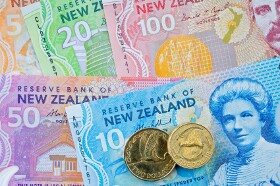The New Zealand dollar traded largely lower against its most-traded peers but, surprisingly, demonstrated resilience versus safer currencies, such as the Japanese yen and the Swiss franc. Macroeconomic reports in China, New Zealand’s biggest trading partner, were decent but data in New Zealand itself was not good. Trading was subdued today, especially during the Asian session, as markets in Japan and Singapore were closed for a holiday.
ANZ business confidence index dropped to -42.4 in August from -31.8 in July. The report explained probable reasons for deteriorating confidence:
There are three prongs to this economic crisis: lockdown, closed borders, and an incredibly synchronised global slowdown that will hit exports. So far, weâve navigated the first and managed to eliminate the virus in the process (go team!). But weâre still a long way from the finish line. And with temporary fiscal support measures poised to roll off in coming months, and the impacts of a closed border to be fully felt only when the peak-tourism summer season arrives, there are plenty of economic hurdles to clear yet. Todayâs data is indicative of exactly that.
Meanwhile, China’s Consumer Price Index rose 2.7% in July, year-on-year, accelerating from the previous month’s 2.5% rate of growth and slightly exceeding market expectations of 2.6%. While the Producer Price Index declined 2.4%, the rate of decline was somewhat slower than the average forecast of 2.5% and significantly slower than 3.0% registered in the prior month.
Some market analysts speculated that the New Zealand currency fell also because the market sentiment was cautious due to the geopolitical tensions between the United States and China. But that looks doubtful considering that the kiwi managed to hold ground against safer currencies, which tend to rise when traders feel fear.
NZD/USD fell from 0.6604 to 0.6592 as of 12:21 GMT today, and its daily low was at 0.6577. EUR/NZD gained from 1.7815 to 1.7838, reaching the high of 1.7874 intraday. At the same time, NZD/CHF climbed from 0.6026 to 0.6046, rebounding from the daily low of 0.6001.
If you have any questions, comments, or opinions regarding the New Zealand Dollar, feel free to post them using the commentary form below.
